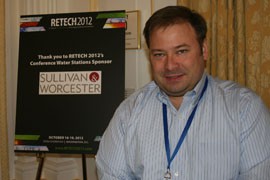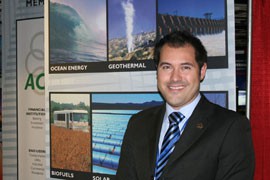Cronkite News has moved to a new home at cronkitenews.azpbs.org. Use this site to search archives from 2011 to May 2015. You can search the new site for current stories.
Solar energy officials see bright future, but still need help getting there
WASHINGTON – There are four elements needed for the growth and vitality of the solar-energy industry, but none may be more important than continued incentives for both manufacturers and consumers, industry officials said this week.
Ryan Simpson, business development manager for Phoenix-based Power-One, said the industry needs to educate consumers, find a better way to store solar energy and keep improving the technology behind the invention and manufacture of solar products.
But Simpson, who was one of more 1,000 attendees at the American Council on Renewable Energy convention in Washington, said none of those things would be possible without government funding.
“The industry would survive, but many companies wouldn’t be here today without the incentives,” Simpson said.
That theme was echoed in many conversations and presentations at the conference.
“It sounds like he’s singing my song,” said Tom Weirich, an ACORE vice president for membership and corporate relations, who ticked off the same elements as Simpson.
While more technological improvement is needed, however, not everyone agrees that it should be done with government incentives.
David Kreutzer, a research fellow in energy economics and climate change at the Heritage Foundation, said he does not think it is a good idea to invest taxpayers’ money in something that relies so heavily on government funding.
“We don’t want the government to subsidize or mandate the production of inefficient energy,” Kreutzer said. “If it costs $10 to produce $8 worth of energy, that’s a bad idea.”
But Simpson said the goal is to move away from incentives as the industry advances and improves. He believes the price of producing solar energy will continue to fall until it becomes affordable for consumers, allowing the industry to become less dependent on government money.
“You need to make it more affordable for everyone so we don’t have to be so connected to the incentives,” Simpson said.
One important step would be designating a leader to oversee and support the growth of the renewable-energy industry, Weirich said.
Weirich said each state has unique resources and could benefit from different types of renewable energy. Not every state has the solar-energy potential of Arizona, he noted.
“We’re a country of 50 different renewable markets,” he said. “We need to have policies that are most beneficial for each state.”
Simpson agreed that without a leader to focus state efforts, it will be nearly impossible to “make monumental, best-in-class changes.” But he is not surprised that solar energy often takes a back seat, because “there are many other issues that are more important to the consumer.”
That is why Simpson said that educating consumers is one of the four things he believes the industry needs to do a better job of doing before it can move forward.
Another element is the networking opportunity that conferences like ACORE’s present, and the ability they offer to see the larger picture.
“You have to think globally,” Simpson said. “There are so many emerging markets in the world. What I try to do is find people who know other people and make a love connection somehow.”









